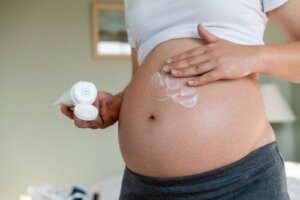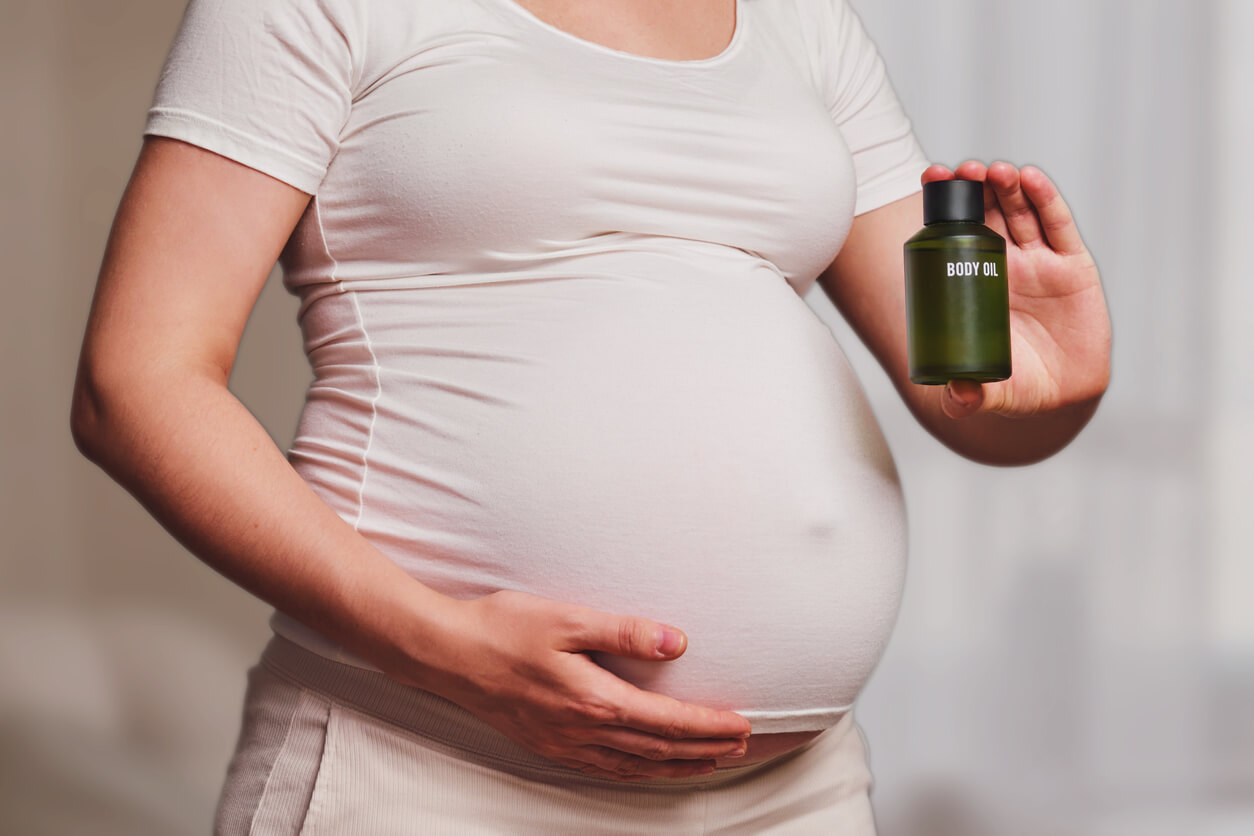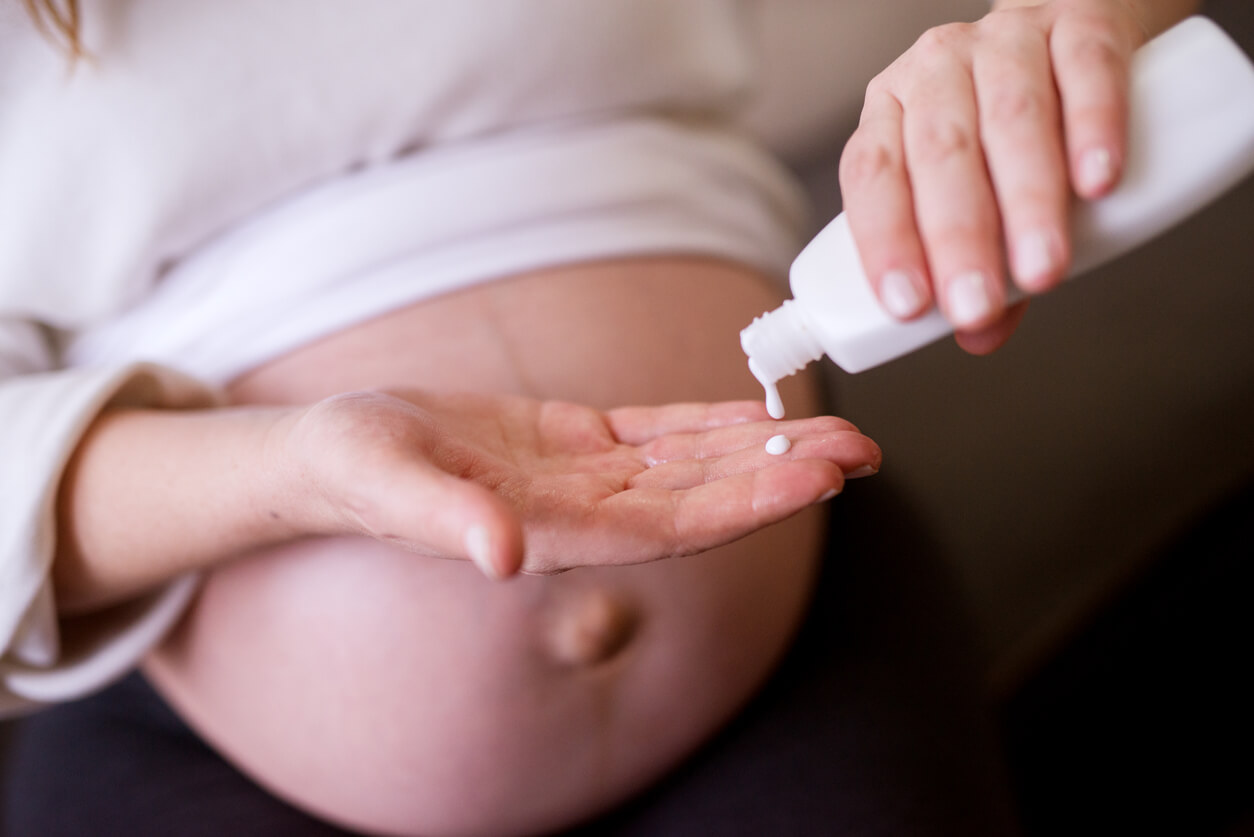10 Prohibited Skincare Ingredients During Pregnancy


Written and verified by the dermatologist Maria del Carmen Hernandez
There are different ingredients in skincare creams that are prohibited during pregnancy. This is due to the susceptibility of the skin surface to become irritated or hyperpigmented during this period. In addition, some of these substances can be absorbed by the body and therefore can also reach the baby.
Why some skincare ingredients are prohibited during pregnancy
During pregnancy, the skin undergoes changes caused by elevated levels of hormones in the body. Some of these, according to The American College of Obstetricians and Gynecologists, are as follows:
- Acne
- Melasma (localized hyperpigmentation)
- Xerosis
- Telangiectasias
In addition to the changes caused in the skin, nails, and hair are also influenced to varying degrees by hormonal changes.
Read also: Skin Allergies During Pregnancy
Know which skincare ingredients you should avoid
There are ingredients in some skincare products that aren’t recommended because they’re easily absorbed and can cause adverse effects. The Food and Drug Administration requires skincare and hygiene products to be safe based on their usefulness, but they don’t require approval to be sold.
1. Essential oils
Essential oils can penetrate the skin quickly through lipid structures and interact with cell membrane proteins to induce certain modifications.
You may be interested in: A Guide to Beauty Products During Pregnancy

2. Retinol or vitamin A
Some of the products that are used for skincare and hygiene routines have in their composition a variant of retinol called retinoids. Over-the-counter products have low levels in their composition, while those prescribed by a specialist contain higher concentrations.
The role of topical retinoids is still controversial in published cases of embryopathy, so their use isn’t recommended during pregnancy.
3. Caffeine
Creams intended to reduce the appearance of cellulite have a high concentration of caffeine in their components. In fact, it’s one of the most commonly used active ingredients due to its lipolytic fat-burning action.
However, it’s contraindicated in pregnancy due to its ability to cross the placenta and pass into breast milk during lactation. It’s best ideal to avoid the active ingredient in all its presentations, as well as dermal patches.
4. Salicylic acid
This type of acid is very useful in cases of acne thanks to its anti-inflammatory properties. However, products containing high concentrations of salicylic acid should be avoided during pregnancy.
Salicylic acid can be absorbed systemically, so its use isn’t recommended during breastfeeding and pregnancy due to the lack of information regarding its safety.
5. Glycolic acid
Glycolic acid is one of the most commonly used alpha hydroxy acids in cosmetics and peelings to treat acne. Although it doesn’t usually present high absorption and adverse effects, its use isn’t recommended during pregnancy due to skin sensitivity and predisposition to hyperpigmented lesions.
6. Hydroquinone
Hydroquinone is used as a topical depigmenting agent in diseases such as melasma. Although there’s no evidence of malformations or adverse effects on the baby, it’s best to minimize exposure to this product due to its high absorption power.
7. Parabens
Parabens are used as artificial preservatives in cosmetics and skin and body care products. In other words, they’re added to prevent and reduce the growth of mold or harmful bacteria.
They’re linked to endocrine disruption and male and female reproductive harm. In addition, the skin can become sensitized to products containing parabens, leading to irritation.
8. Phthalates
Phthalates are chemicals in some beauty products that cause endocrine disruption. These disruptors play an important role in negatively altering congenital reproductive health.

9. Chemical filters
Sunscreens are used to protect the skin from ultraviolet rays and to treat or prevent melasma. However, oxybenzone and its derivatives, which are the most commonly used filters in these products, could be harmful and cause damage.
10. Trichloroacetic acid
Trichloroacetic acid (TCA) removes dead skin cells and stimulates the growth of new cells on the skin’s surface. Therefore, peels are performed using different combinations and concentrations of acids.
Deep peels should be avoided in pregnant women due to skin sensitivity and vulnerability to developing hyperpigmentation.
Prohibited ingredients in skincare products during pregnancy
Pregnancy is a woman’s state in which hormonal alteration causes changes in different organs of the body. In this regard, the skin isn’t exempt from this. In fact, it becomes more irritable and sensitive, with a greater predisposition to acne. Therefore, taking care of the skin at this stage is extremely important, as is knowing how to choose the most suitable product.
There are different ingredients in skincare creams that are prohibited during pregnancy. This is due to the susceptibility of the skin surface to become irritated or hyperpigmented during this period. In addition, some of these substances can be absorbed by the body and therefore can also reach the baby.
Why some skincare ingredients are prohibited during pregnancy
During pregnancy, the skin undergoes changes caused by elevated levels of hormones in the body. Some of these, according to The American College of Obstetricians and Gynecologists, are as follows:
- Acne
- Melasma (localized hyperpigmentation)
- Xerosis
- Telangiectasias
In addition to the changes caused in the skin, nails, and hair are also influenced to varying degrees by hormonal changes.
Read also: Skin Allergies During Pregnancy
Know which skincare ingredients you should avoid
There are ingredients in some skincare products that aren’t recommended because they’re easily absorbed and can cause adverse effects. The Food and Drug Administration requires skincare and hygiene products to be safe based on their usefulness, but they don’t require approval to be sold.
1. Essential oils
Essential oils can penetrate the skin quickly through lipid structures and interact with cell membrane proteins to induce certain modifications.
You may be interested in: A Guide to Beauty Products During Pregnancy

2. Retinol or vitamin A
Some of the products that are used for skincare and hygiene routines have in their composition a variant of retinol called retinoids. Over-the-counter products have low levels in their composition, while those prescribed by a specialist contain higher concentrations.
The role of topical retinoids is still controversial in published cases of embryopathy, so their use isn’t recommended during pregnancy.
3. Caffeine
Creams intended to reduce the appearance of cellulite have a high concentration of caffeine in their components. In fact, it’s one of the most commonly used active ingredients due to its lipolytic fat-burning action.
However, it’s contraindicated in pregnancy due to its ability to cross the placenta and pass into breast milk during lactation. It’s best ideal to avoid the active ingredient in all its presentations, as well as dermal patches.
4. Salicylic acid
This type of acid is very useful in cases of acne thanks to its anti-inflammatory properties. However, products containing high concentrations of salicylic acid should be avoided during pregnancy.
Salicylic acid can be absorbed systemically, so its use isn’t recommended during breastfeeding and pregnancy due to the lack of information regarding its safety.
5. Glycolic acid
Glycolic acid is one of the most commonly used alpha hydroxy acids in cosmetics and peelings to treat acne. Although it doesn’t usually present high absorption and adverse effects, its use isn’t recommended during pregnancy due to skin sensitivity and predisposition to hyperpigmented lesions.
6. Hydroquinone
Hydroquinone is used as a topical depigmenting agent in diseases such as melasma. Although there’s no evidence of malformations or adverse effects on the baby, it’s best to minimize exposure to this product due to its high absorption power.
7. Parabens
Parabens are used as artificial preservatives in cosmetics and skin and body care products. In other words, they’re added to prevent and reduce the growth of mold or harmful bacteria.
They’re linked to endocrine disruption and male and female reproductive harm. In addition, the skin can become sensitized to products containing parabens, leading to irritation.
8. Phthalates
Phthalates are chemicals in some beauty products that cause endocrine disruption. These disruptors play an important role in negatively altering congenital reproductive health.

9. Chemical filters
Sunscreens are used to protect the skin from ultraviolet rays and to treat or prevent melasma. However, oxybenzone and its derivatives, which are the most commonly used filters in these products, could be harmful and cause damage.
10. Trichloroacetic acid
Trichloroacetic acid (TCA) removes dead skin cells and stimulates the growth of new cells on the skin’s surface. Therefore, peels are performed using different combinations and concentrations of acids.
Deep peels should be avoided in pregnant women due to skin sensitivity and vulnerability to developing hyperpigmentation.
Prohibited ingredients in skincare products during pregnancy
Pregnancy is a woman’s state in which hormonal alteration causes changes in different organs of the body. In this regard, the skin isn’t exempt from this. In fact, it becomes more irritable and sensitive, with a greater predisposition to acne. Therefore, taking care of the skin at this stage is extremely important, as is knowing how to choose the most suitable product.
All cited sources were thoroughly reviewed by our team to ensure their quality, reliability, currency, and validity. The bibliography of this article was considered reliable and of academic or scientific accuracy.
- Lipson AH, Collins F, Webster WS. Multiple congenital defects associated with maternal use of topical tretinoin. Lancet. 1993 May 22;341(8856):1352-3. doi: 10.1016/0140-6736(93)90868-h. PMID: 8098487.
- Bozzo P, Chua-Gocheco A, Einarson A. Seguridad de los productos para el cuidado de la piel durante el embarazo. Puede Fam Physician . 2011; 57 (6): 665-667.
- Vora RV, Gupta R, Mehta MJ, Chaudhari AH, Pilani AP, Patel N. Pregnancy and skin. J Family Med Prim Care. 2014;3(4):318-324. doi:10.4103/2249-4863.148099
This text is provided for informational purposes only and does not replace consultation with a professional. If in doubt, consult your specialist.








